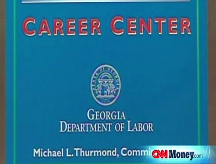A dream job, 500 miles from home
In a tough market, job seekers who consider positions in other cities or states may have more success.
 |
| In pursuit of a career in the apparel industry, Anna Levia has relocated three times in seven years. |
| MMA | 0.69% |
| $10K MMA | 0.42% |
| 6 month CD | 0.94% |
| 1 yr CD | 1.49% |
| 5 yr CD | 1.93% |
NEW YORK (CNNMoney.com) -- When Aaron Swarvar graduated from college in 2003 he searched for months for a position related to his degree in information technology. But those jobs were scarce near his hometown in Michigan.
"I offered to work for someone for free for a couple of weeks to get my foot in the door and I was even turned down on that," he said. "At that point I started looking around the country."
Swarvar, now 27, eventually accepted a position as a project engineer at a firm outside of Chicago. "At first I was apprehensive about going," he said, but with limited options, he packed up his belongings to pursue his career 200 miles from home.
Despite a low starting salary, higher cost of living and no relocation package, Swarvar says the move was well worth it.
"I feel fortunate to be where I am, it turned out great."
In a worsening job market, more job seekers, like Swarvar, will have to consider positions beyond their geographical region if they hope to shorten their search time. But even though the pay off can be worth it, those on the hunt are often reluctant to relocate for work, according to a recent report by outplacement firm Challenger, Gray & Christmas.
Only 13% of job seekers finding positions in the third quarter relocated for their new positions, the report said. And that resistance to relocating can lead to a longer job search. An average search lasted about 4.4 months in the third quarter, up from 3.6 months in the previous quarter, according to Challenger.
Part of that reluctance has to do with the state of the housing market, explained CEO John Challenger. "People don't want to be caught now in this uncertain market," he said. Plus, in a slow economy, employers are also less willing to offer attractive relocation packages, which can make it even more difficult for applicants to pick up and go.
Those who are open to looking for jobs in other locations in an effort to expand the scope of their search do find jobs more quickly, Challenger said. In addition, seekers willing to relocate to small cities or towns may have better luck since that's where companies have a particularly hard time attracting talent.
That's what worked for Anna Levia, 31. With a degree in apparel design and few options near her home in Tennessee, Levia knew that her job prospects would entail moving. "It's one of those things that you have to do if you live outside of New York," she said.
Her first move meant taking her family over 500 miles north to Green Bay, Wis. Three years later, Levia, along with her husband and daughter moved back Tennessee so she could accept a better position.
But when her new company announced it was closing its Memphis office, Levia began her search all over again.
This time she accepted a position in Monroe, Wis., which paid more than she was making before. "It's hard to get people to relocate, so they were willing to put me to where I need to be." Within three months she was the manager of her department, she said.
For other job seekers willing to relocate, Challenger recommends keeping the relocation negotiations on the back burner, at least until an offer is on the table. In fact, some applicants don't even mention the prospect of moving during the interview process because the added expense can be a "red flag" to a potential employer, Challenger said.
Once the employer has made an offer, then you might be able to negotiate moving costs, hotel stays or even the cost of a temporary residence, he said. While relocation packages are usually a hard sell for the employer, most realize they may need to sweeten the deal to attract talent.
Despite being happy in her current position, Levia says she doesn't know if she would do it all over again. Three moves in seven years have taken a toll. In fact, she was unable to sell her home after her first relocation. The house will likely be in foreclosure soon, but that's the price she paid, she said, to help feed her family. ![]()


